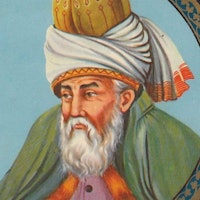The command ‘come against your will’ is for the blind follower of religion. ‘Come willingly’ is for the sincere.
Jalaluddin Mevlana Rumi

Real Beauty and Real Love
Topic: Virtue, Morality, & Ethics
The command come against your will
is for the blind follower of religion.
Come willingly is for the sincere.
The former loves God for something else,
while the sincere one has a pure, real love.
The former loves the Nurse,
but for the sake of the milk,
while the other has given his heart
for the sake of the Nurse Herself.
The child is blind to Her beauty—
he just wants milk,
while the other is truly the lover of the Nurse—
single-mindedly, passionately in love.
Jalāl al-Dīn Muḥammad Rūmī (born September 30, 1207, in Balkh, present-day Afghanistan – died December 17, 1273, in Konya, present-day Turkey) is revered as one of the world’s greatest poets, mystics, and spiritual teachers. Known in the West simply as Rumi, he was born into a family of scholars and mystics who fled westward during the Mongol invasions, eventually settling in Konya, then part of the Seljuk Empire. Under the guidance of his father, Bahāʾ al-Dīn Walad, Rumi was trained in Islamic theology, jurisprudence, and the contemplative disciplines of the Sufi path. His early years reflected the classical model of a scholar-saint—rooted in devotion, study, and service to his community.
Rumi’s life was transformed by his meeting with the wandering mystic Shams of Tabriz around 1244. Their profound spiritual companionship awakened in Rumi a passion that transcended formal learning and opened him to the depths of divine love. When Shams mysteriously disappeared, Rumi’s grief became the flame that illuminated his poetry and devotion. From this crucible emerged the Mathnawī, often called the “Persian Qur’an,” a six-volume masterpiece that weaves stories, parables, and reflections into a vision of love as the animating force of all creation. His shorter lyric poems, collected in the Divan-e Shams-e Tabrizi, sing of longing, union, loss, and the ecstatic dance between the soul and the Beloved.
Rumi’s teachings centered on the transforming power of divine love, the unity underlying all faiths, and the inward journey from self-centeredness to God-centeredness. He taught that every experience—joy and sorrow, presence and absence—serves as a mirror reflecting the divine mystery. After his passing, his followers established the Mevlevi Order, known for its sacred whirling as a form of remembrance (dhikr). Across eight centuries, Rumi’s voice has transcended language, culture, and creed, inviting seekers into the stillness of the heart where the human and divine meet in love."
Rumi's spiritual journey led him to develop a unique approach to Sufism that emphasized love, tolerance, and the pursuit of enlightenment. He created a fusion of traditional Islamic beliefs with mysticism, nurturing a school of thought that flourished in his followers. They established a sect known to the Western world as the 'Whirling Dervishes', a term derived from their mesmerizing practice of whirling as a form of physical meditation. The proper name for this branch is the Mevlevi order, dedicated to preserving and promoting Rumi's teachings.
In addition to being a mystic, Rumi was an accomplished scholar and theologian who left behind an impressive literary legacy. His best-known work, the Mathnawi or Masnavi, is a six-volume poetic epic that explores themes of love, divine mystery, and human connection to the spiritual world. Rumi's poetic style is marked by profound emotion and philosophical depth, weaving metaphors and allegory to create timeless pieces that continue to inspire readers today. Rumi's influence reaches far beyond his time, as his teachings on love, compassion, and unity continue to touch the hearts of millions, transcending barriers of religion, culture, and era.
Mathnawi
Rumi, Jalaluddin Mevlana. The Rumi Daybook. Translated by Kabir Helminski and Camille Helminski, Shambhala Publications, Inc., 2012, p. 228 [Mathnawi III: 4590-4594].

Jalaluddin Mevlana Rumi
Theme: Virtue Is

Jalaluddin Mevlana Rumi, Mathnawi III: 4590-4594 [Commentary]
Rumi directly confronts us with two types of love for God. One is conditional, driven by what one can receive in return, like a child loving a nurse only for the milk she provides. The other is sincere, unfiltered love, comparable to someone who loves the nurse for who she is, not for what she can give. When Rumi says “The former loves God for something else,” he is telling us that this kind of love falls short. It’s a transaction, not a true relationship.
The deeper love, according to Rumi, is love for God that exists for its own sake. It’s not about what one can gain, whether that’s heaven or some other reward. It’s about a heartfelt and devoted relationship with the Divine. This love is not just another item on a list of virtues; it is the foundation upon which all virtues are built. It’s the sort of love that makes us better individuals and allows us to connect authentically with others and the world around us.
In essence, Rumi asks us to examine our love for God and question if it is genuine or conditional. He points us toward a love that isn’t contingent on receiving something in return. This is a direct invitation to assess the quality of our devotion, not just to God but also in how we love in our earthly relationships. It’s an invitation to purity, to sincerity, and ultimately, to a more virtuous life.
Additional Rumi Poems
Related Quotes
Copyright © 2017 – 2025 LuminaryQuotes.com About Us